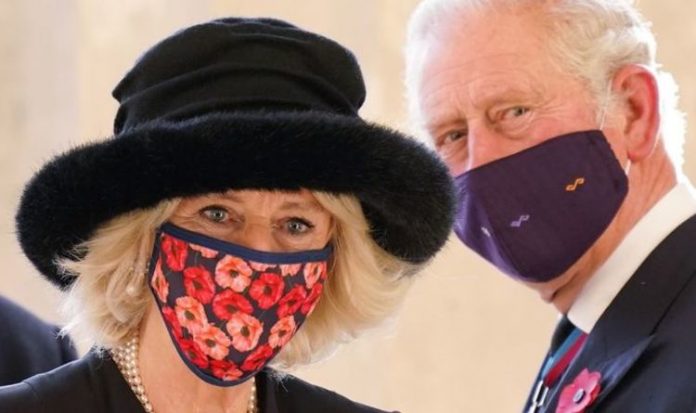Prince Charles and Camilla narrate poem for actors’ charity
Prince Charles and Camilla started experiencing an increased number of hate comments via their social media channels from mid-November. A few days later, on November 24, Clarence House limited the possibility to reply to its tweets only to accounts it follows or mentions. The royal office did not comment on the reasons behind this move.
However, many royal watchers argued it may have been taken to curb the number of vicious comments Charles and Camilla were being inundated by, many of which appeared to be related to the latest season of Netflix’s The Crown and the events it portrays.
Despite turning comments off, the prince and duchess continue to be targeted by Twitter trolls.
While some simply write their hateful messages on Charles or Camilla, sometimes mentioning Clarence House in their tweets, others retweet Clarence House content and comment on it with vile abuse.
One social media and PR expert noted being trolled online has become a real problem for many.

Prince Charles and Camilla are being hit by vile abuse on social media (Image: GETTY)

Prince Charles and Camilla have continued to work throughout the coronavirus pandemic (Image: GETTY)
However, he also believes these hateful messages have a “brief shelf-life” and there are ways to tackle them.
Mike Shields, Head of PR at Distract, told Express.co.uk: “Where comments have been retweeted or screenshot, you have to remember that the world of social media moves so incredibly fast that comments such as these have a very brief shelf-life.
“The average ‘life’ of a tweet, meaning the time it spends as a new comment for everyone to see, is only around 15 or 20 minutes, such is the sheer volume of posts via Twitter every minute.
“More than 500 million tweets are sent per day and unless from a high-profile account, rarely go viral as much as they might have a few years ago.”
Mr Shields believes Charles and Camilla’s office was right to shut down the comments.
READ MORE: Camilla Parker Bowles wears blue but trolls descend on Duchess

Prince Charles and Camilla’s Twitter account regularly shares news of their royal engagements (Image: GETTY)
He continued: “The subject of trolling has become ever more prevalent in the past few years as anyone with a connection can make comments, be it from personal accounts or anonymously.
“With this wave of hateful comments, it’s clear that this is becoming a real problem for high profile individuals such as the royals.
“The best approach to take in this situation on social media, and what we normally advise clients to do is to not respond directly.”
Protection and privacy, Mr Shields continued, should be the path to follow during similar crises – as Clarence House has already done.
He continued: “By limiting who can comment on social media posts, they are preventing their own profiles from being overrun with negative comments or posts.”
DON’T MISS
Camilla: Guardsman helps Duchess of Cornwall decorate tree

Prince Charles and Camilla married in 2005 (Image: GETTY)
Responding to hate comments, Mr Shields added, is rarely beneficial.
On the other hand, continuing to put out the royals’ message and promote the work they do every day will help to fend off the attacks and let positivity prevail on the Clarence House’s timeline.
He said: “As much as these comments may be negative, responding directly to them or trying to control them is a thankless task and the best way to deal with this is to carry on as normal and wait for the interest to diminish.
“A solid, positive social media presence can do wonders to combat any negativity and so maintaining a neutral stance is the best option here.
“As the old adage goes ‘Don’t Feed The Trolls’.”
Another social media expert, Sara Tye, also believes Clarence House is dealing with online trolling in the right way.

Prince Charles and Camilla made their relationship official in 1999 (Image: EXPRESS)
The founder of RedHead PR told Express.co.uk: “The press office at Clarence House has done the correct thing by limiting the engagement.
“On social media, you can’t deal with every bad comment as some comments are actually not even real comments – they can be fake accounts set up to fuel bad perception to get an outcome which might be skewed.
“So – they are taking the correct approach. In the end, the couple would need to evaluate whether it was worth trying to keep up their proactive appearance and get on with their daily activity.”
The expert added it is likely this string of hate comments will “run its course”, depending on what is fuelling it.
The couple, Ms Tye added, “will always have their critics” as they are prominent personalities.

Prince Charles and Camilla first met in the 1970s (Image: GETTY)
But, she continued: “They have dealt with much worse publicity in the past and got through it.”
Over the past few weeks, Clarence House has continued to share pictures and videos taken during Charles and Camilla’s engagements.
In the run-up to Christmas, the Twitter account also shared two poignant videos filmed to back and raise awareness on two key patronages of the royals.
Camilla featured in one recorded alongside a few children and their parents supported by the children’s hospice Helen and Duncan House.
The Duchess of Cornwall was also featured in a video released on Christmas Eve in support to the Actors Benevolent Fund, of which Prince Charles is the patron.
In it, the royals and seven beloved actors read the poem ‘Twas the Night Before Christmas’.







